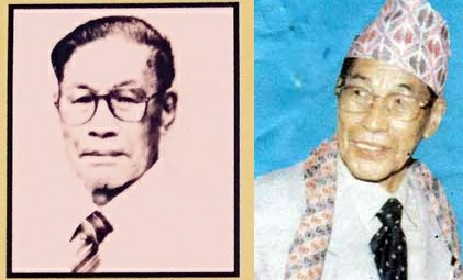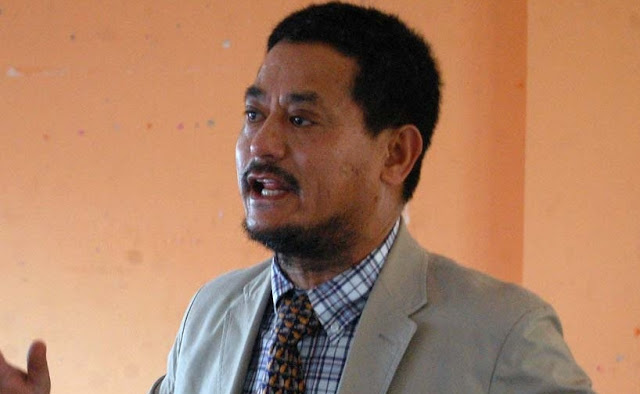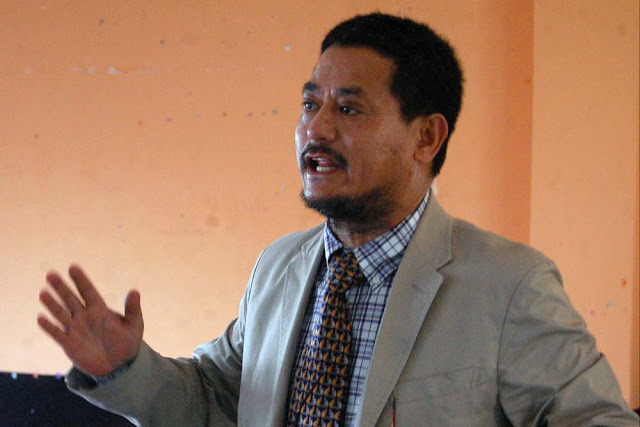Writes - MAHENDRA P LAMA
May 7, 2016- Though I always deeply enjoyed reading literary works of Hari Prasad ‘Gorkha’ Rai and heard so much about him from my revered father RP Lama and his friends at Su-Dha-Pa (Surya Bikram-Dharnidhar-Parasmani) hall of Nepali Sahitya Sammelan in Darjeeling, I had the opportunity to interact with ‘Gorkha’ Rai-jyu just twice—once in New Delhi and the next time in Gangtok. However, both these encounters remained a rare occasion for me. I was struck by his simplicity and his inclusive views on life outside the geographies of Nepali-speaking communities like Sikkim and Darjeeling. In the course of our interaction, my major question was: how did he find life among the Nagas in Nagaland and Ahoms in Assam, and how could he produce so many literary works in not only Nepali literature but also in Assamese and other languages? He was candid and forthright when he said that Gorkhas, by nature, are a very friendly and jovial community and could go along with any community, particularly in a democratic set up. He further narrated how the Nagas and Assamese intermingled with the Gorkhas and extended social and political support for their upliftment. There are moments of apprehensions and misunderstanding but are largely overshadowed by the larger issues of peaceful coexistence and Indianness and more critically social cohesiveness. This was typical of ‘Gorkha’ Rai-jyu, a man who carried a halo of intellectualism in his ever-glowing face. His views are not different than what one hears from other Nepali literary figures in the North East region of India. They all nurtured a feeling of ‘regional oneness’, amidst huge diversity in their approaches to their day-to-day lives.
 |
| Hari Prasad ‘Gorkha’ Rai |
‘Gorkha’ Rai-jyu stands among many distinguished writers of his generation, like Acchha Rai Rasik, Lain Singh Bandel, Siva Kumar Rai, Indra Sundas, Rup Narayan Sinha, and others. Oh! How I loved reciting his famous poem Kamp Uthyo in my college and university days. They always ended with loud chants of ‘once more’. ‘Once more’ not because of the style of recitation but the contents of the poem and high decibels of ‘encore’, not because of the enthralment this recitation generated but for the bourgeoning fascinations of the Gorkha youths towards their own literary traditions. Yes, he used attractively engaging common words and expressions. Many of our friends would actually cry and howl whenever there was an announcement of the arrival of Kamp Uthyo. I myself used to get goose bumps before I stepped onto the stage and held the microphone.
Another poem I frequently recited in public was Bairagi Kainla’s Mateko Mancheko Bhashan: Madhyarat Pachiko Sadaksita. We simply photocopied these poems in an old manual photocopy machine at a pretty high cost and distributed it. These recitations still echo in the lawns of the Fraser Hall of St Joseph’s College and North Bengal University in Darjeeling and the Mavalankar Hall of New Delhi. That was the late 1970s and 1980s when Indian Gorkhas across the country were struggling and collectively fighting for the recognition of the Nepali language in the 8th Schedule of the Constitution of India; the decades when the Indian identity of the Indian Gorkhas were brought to the political table and negotiated in the name of a separate state of ‘Gorkhaland’ comprising of Darjeeling and adjoining Dooars region of West Bengal. This was the time, when in the name of ‘foreigners’, a large number of Indian Gorkhas were inhumanly displaced and ousted in several North East States in the name of ‘cleansing their lands’. This was the time when the Indian nation state failed to protect their own hapless but true citizens amidst the parochial cacophony of ‘foreigners go back’. History will never forget these atrocities and discriminations against the Indian Gorkhas who valiantly fought and immensely contributed in India’s freedom struggle and in the building of modern India. Who will deconstruct the present history and reconstruct the more inclusive history is a question the Indian Gorkhas have been asking. We lost the game as majority of our political leadership who could take up these issues are literally uneducated, both in terms of acquired degrees and knowledge. This is a tragedy among the Indian Gorkhas.
What I like in Kamp Uthyo (literally meaning uprooting of a camp from his anthology of poems Babari published in 1974) is its depiction of a soldier’s life and its uncertainty; more critically the story of separation that underlines the entire narrative, the beautiful elucidation of a soldier’s dilemma who has made friends around the camps with humans, flowers and nature’s ecology. The soldier has reached Shillong from Darjeeling, and settles down in the military camp. The depiction of Gorkha soldier’s attachment with his roots in Darjeeling and his unparalleled ability to adapt to a new geography and society makes the reading both absorbing and powerfully touching.
Like in the past, the inimitable soldier has to leave Shillong now as they have to camp in some other frontier. By now, he has friends around with their names typical of a hill society, developed some mutual infatuation with a local girl named Sita and strong attachments with the societal practices, community living styles in Shillong. He realises and accepts that there lies uncertainty in his new destination but like a true soldier he is ready to bravely face death. A sense of sacrifice and unenviable attachment to their motherland prevails in him, something with which Gorkhas are born with. He imagines that flowers will bloom in his cemetery and passersby could assume it to be a magnificent garden. This is the way he personifies the life of a soldier who devours his physical being at the frontiers of battlefield—a superb personification where one is born to die but meaningfully like a Gorkha soldier.
Good bye Shanti! Good bye Bire!
Good bye my friend Dhane!
Good bye Manu! What do I say to you
Never will come that day
Good bye Hari
Good bye to all of you!
The symbols of quietness—my dear Sita
You are like a Goddess
Shall always wrap and unfold you into my own story
My rude sister Maily
Shall meet you during my dejected moments.
do say my goodbye to that sister
who accompanied me to Suna-Kurung falls
Please count these goodies to the one
who quietly peeped me from her window panes
Oh now the bugle is sounding
I have to go for a ‘fall in’
Where a Gorkha has not reached?
everywhere whether ‘fall in’ or in no ‘fall in’
Against the grumping sound of boots
Six tonner vehicle moved with noise
We are moving to the next camp
It’s just a recollection once again
So many Mannus were killed in Marmma
Many Danus were left behind in Burma
Camp is uprooted once again
I am on a move as a soldier
Donot know what awaits us
there in the unknowns,
May be I will remain dead flat
in the battlefield not seen now
And there will blossom bouquet of flowers
On the cemetery I will remain in
Some stranger walking past could think it to be a garden
My bare bones and other remains
would then quietly narrate my story
Chanting the gregarious call of Aayo Gorkhali
(here arrive the Brave Gorkhas)
I shall reach far beyond
Good bye forever ! Good bye and again good bye
My dear Sita
Forever be near me and nearer me.
His short stories are absorbing and gives us fresh waves of joys and shocks of acute pain and of course, penetrating anguish. He is a deadly connoisseur at creating something that is beautiful. His short story Banani Banki Sundari (beauty from Banani forest, published in Bharati, Kalimpong, 1973) and reviewed in the prestigious Masterpieces of Indian Literature (National Book Trust, New Delhi, 1997) by this author refreshed memories about the rebellion in Mizoram. In this complex and chilling story, Lainsemi lived with her mother in Mizoram hills and had developed intense love for Captain Raj who was posted there to supervise the operations against the rebels. These rebels once forcedly took away Lainsemi from her home, took her to their camp and invaded her morals from her soul and sent her back bereft of physical value. On her way back, she meets her Captain-lover who was returning from Darjeeling from a short leave. And then she narrates to him all that happened.
‘Gorkha’ Rai-jyu will ever be remembered for many generation to come. Saraswati, one of his three daughters, took the cudgels of bringing together his memories and contributions in a volume. What is of critical importance for his family and friends is to recollect and re-document what he left for posterity as oral history and unpublished manuscripts. Somewhere in the preface of one of his books he wrote:
“I must confess that I have this habit of writing poems and singing them as songs whenever I get the right moment, theme and actors. ... I never took care of these papers which were drafted and corrected from all sides. Many a times I just tore them into several unrecognisable pieces and forgot them for all the time to come.”
Saraswati could revisit his papers and bring them to public purview as societal intellectual property. This phenomenon is universal among the Gorkhas all over. The ‘oral history’ programme, the ‘winter sojourn’ project and the ‘book discussion’ event and of course ‘Ethnicity and Biodiversity Museum’ which we initiated in the very first five years (2007-2012) of building Sikkim University, a national university, in Gangtok have been exactly aimed at realising these objectives.
We started documenting our rich but unrecorded intellectual heritage through ‘oral history’ (Maukhik Itihas) programme. Our teachers and students visited villages and rugged terrains looking for the custodians of this knowledge and interviewed them, recorded them and transformed them into documents and unusual sets of knowledge base and intellectual capital. In the past we steadily lost so much in terms of knowledge and wisdom when our parents and grandparents faded into oblivion. No one documented them and we lost the game. Whereas same traditional knowledge base was capitalised by the Chinese, Japanese and companies like Coca Cola to generate huge development resources and extend and ensure human security. Therefore, in order to connect the oral history programme with the societies and communities in and around Sikkim we simply said:
Baje Mare Boju Mareen,
Duiwata pustakalaya lierai gae
Aba yesto huna dinnau hai
Thereby meaning:
Grandfather passed away,
Grandmother crossed the horizon,
Along, took away two beautiful libraries,
We shall not let it happen again
The ‘winter sojourn’ (Hiundo Yatra) project aimed at connecting the University and higher education with the communities. The students and teachers will go to a destination in Sikkim and around to study themes like water, brooms, cardamom, trafficking of women, cultural heritage, health, pastime games, forest, local women vendors, etc, from an inter-disciplinary perspective. This helped our students and teachers to understand and assimilate the issues within the locales of their university and also connecting the village folks and city dwellers with the higher education. This generated adequate researchable local and regional issues from within our geography, natural resources and communities so that we steadily move to ‘globalisation of locals’ (knowledge, culture, traditional medicinal systems, adaptation story of climate change, food, literary heritage, and also disaster management techniques etc) and not what is dominantly happening now the ‘localisation of globals’ (Jeans, Samsung, Apple, Pizza, Hamburger, KFC, Honda and Toyota). ‘Book discussion’ (Pustak Chalphal) event was designed to imbibe reading habits among the younger generation and take them nearer to their roots where language, literature, culture, music, sports and young talents profusely flourished in the past.
And finally in the initiation and building of Ethnicity and Biodiversity Museum the aim was not only to realign the locals, national and global citizens with the extravagant and prolific cultural heritage and biodiversity of this region but also make museum as a bastion of research and sustainable development discourses. This is perhaps the first such museum in the entire Eastern Himalayas which was designed by our own teachers and students and management staff with the help of National Museum, National Archives of India and British Council. Rather a proud moment for the hill folks around. There was public fund guzzler-political ‘leaders’ who do not value institutions as they live in the ideology of individualism and destruction of what nature have endowed. Sikkim University initiated all these programmes and built all these institutions blatantly ignoring and sometimes durably exposing this political class with myopic vision and chicken-like thinking. These are the ways forward for all of us who value culture, literature, heritage and renegotiating our children and communities to their glorious past. ‘Gorkha’ Rai-jyu’s writings and speeches very much allude to all these.
Lama is a professor of South Asian Economies, Jawaharlal Nehru University, New Delhi; Also served as the Founding Vice Chancellor, Central University of Sikkim. Considered as the architect of the reopening of Nathu la trade route between Sikkim in India and Tibet Autonomous Region in China after 44 years in 2006, he is a member of Eminent Persons Group on Nepal-India Relations from India
Via ekantipur










+Avinash+Gurung+at+the+Gorkha+Rangamanch+Bhavan+in+Darjeeling+on+Saturday;+Bimal+and+Asha+Gurung+in+the+audience.+Pictures+by+Suman+Tamang.jpg)


